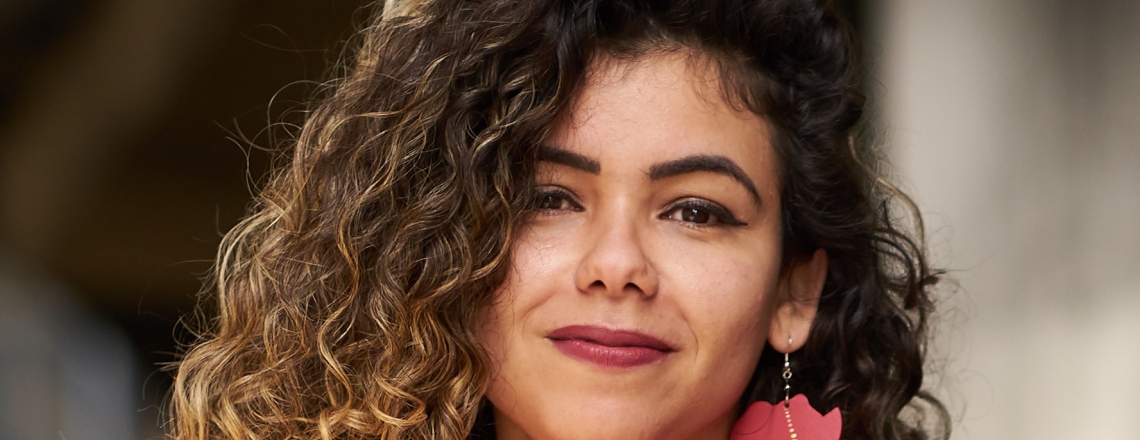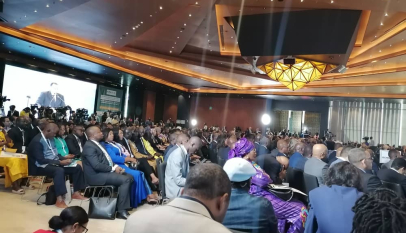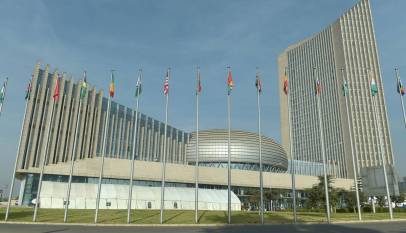INTERVIEW: Young people capable of leading Africa into the future – AU Youth Envoy
Aya Chebbi of Tunisia is the first-ever youth envoy of the African Union. Her appointment in November 2018 boosts the AU’s efforts to include the talents and skills of the continent’s bulging youth population in achieving its Agenda 2063, a framework for Africa’s socioeconomic transformation. Ms. Chebbi is expected to promote, among other issues, youth leadership and participation in governance, gender equality, safe migration, employment and climate change action.

AR: What do you hope to achieve during your tenure?
Chebbi: I have a mandate to advocate for the implementation of the African Youth Charter, the Demographic Dividend Roadmap and Agenda 2063. I see my role as a bridge builder, building trust by closing the information gap between the AU and the African youth, which can be achieved with a strong and bold communication strategy and by establishing accessible and inclusive spaces for conversations that matter to youth at the African Union Commission (AUC). In addition, I aim to foster intergenerational dialogue, starting from the community level, to address the gap between the elders and African youth. I also plan to help mobilize young people around pan-Africanism, bringing them closer to our pan-African vision, which is to lead in efforts at achieving the aspirations of Agenda 2063.
We can achieve these through partnership, support, participation and coordination with young people themselves. This is a “working together” process—listening, sharing and acting to amplify youth voices.
AR: What are your top priorities?
Chebbi: I will say, first, the four pillars of the Demographic Dividend Roadmap: economy, education, health and governance (especially for young women). As well, I will focus on issues affecting refugees, returnees and internally displaced people. As you know, the AU theme for 2019 is “Refugees, Returnees and Internationally Displaced Persons.”
AR: The youth constitute about 60% of Africa’s unemployed. How can we tackle youth unemployment?
Chebbi: We need to start a discussion soon with member states on the future of work in Africa. As much as there is an effort to address job creation, we seem to be creating jobs that will disappear in a few years. There is a need for these conversations, in parallel with urgent action for creating livelihoods for youth. I would like to see the AUC activate the AU Youth Development Fund to support youth-led entrepreneurial initiatives. Youth development funds set up at subregional and national levels can also support youth employment. In addition, supporting the youth with internships, professional programs, trainings and positive experiences is vital.
AR: The 2006 African Youth Charter is a framework for consolidating efforts to empower young people in driving development on the continent. How is its implementation going?
Chebbi: First, we still must make sure that all countries sign and ratify the Charter. Regarding implementation, we have a lot of work to do in many areas, including providing employment, sustainable livelihood, education, health, youth participation and so on.
AR: How can the youth participate effectively and benefit from the African Continental Free Trade Area?
Chebbi: As part of the economic integration project, the AfCFTA is a step forward. Creating jobs through intra-African trade may discourage the youth from migrating out of Africa in search of better opportunities. The AfCFTA requires African states to add value to their primary commodities and boost their services sector. For young people to benefit from a huge pan-African market, countries must revisit their education curricula to ensure that acquired knowledge and skills are adapted to market needs. Young people must develop the capacity for entrepreneurship. There is a need to promote science, technology, engineering, maths and entrepreneurship in schools. The youth are better placed to participate in the digital economy.
AR: How do you plan to promote the AU and its Commission to young people?
Chebbi: The AU is an institution that was formed on the values of pan-Africanism, and we should not give up on it. The union holds the legacy of our collective liberation and collective future. Besides, it is important to understand how the AU is organised so that we can manage expectations of what it can achieve. The AU as a regional body does not have the power to implement or enforce policies in individual countries. This remains a key challenge in the implementation of policy frameworks and themes adopted by the AU Assembly. We should strengthen and reform the AUC to be more effective. Young people should be encouraged to lead some of its organs. I accepted the appointment because of a strong conviction that the AU will always remain relevant to Africa’s unity.
AR: How did you get to be appointed the AU’s youth envoy?
Chebbi: I was appointed through a transparent process. There was an open call online for youth to submit their applications for the position. I applied and was among the 706 applicants, of which a shortlist of 17 was made and then four of us were invited for interviews. A panel of 14 members interviewed me. It was the biggest panel I have ever faced. Every member of the panel had to score the candidates according to the set criteria. I scored the first.
AR: What is your final message to African youth?
Chebbi: My message is, you can be whatever you want to be. There are only two things you need to do: find your identity and live your mission. You need to know who you are and what you stand for. Once you know your identity, know why you wake up every day and why you do what you do, that’s your mission. I want my appointment to be an inspiration to other African youths to pursue leadership positions wherever they are and in whatever they do. I would like to add that young people should aspire to be pan-Africanists. We have been talking a lot about the ’60s and the liberation movements that inspired us. Now we need to be the pan-Africanists of the 21st century, to lead this continent to where it deserves to be. The future of Africa is certainly bright if we unite around this collective pan-African vision that my liberation is your liberation.
Source: Africa Renewal













